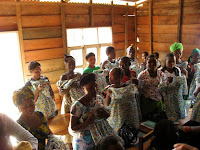March 10th, 2009
Dear Friends and Family,
Last evening we returned from our medical mission in Africa. I find myself crying a lot. Am I tired? Not really. Tired is not being able to stay awake past nine after a day of travel on bumpy roads, medical clinics and sights and stories that awake you in the middle of the night as the mind tries to solve the problems we have seen. Oh I know that we can’t solve the big issues, the poverty issues, the political issues, the strife, the conflict, the hate. But one “starfish” at a time is our motto. We can take care of a fraction of their pain when we come and touch them with primary care, a smile, a blessing. “Mungu aku barike. God bless you.”
This mission we extended MEDS for Africa from Kenya into Rwanda and The Congo. Kenya was our continuation of medical clinics with Sister Freda Robinson in Kitale, Kenya and into the rural areas of Pokot, Narouk, the Masai Mara and Bosnia, a refugee camp named after those refugees. Then David and I went to Rwanda, a beautiful country that is moving on from the Genocide of 1994 and 1995. Poverty still remains but they have a lush green country set in hills and mountains. The wonderful people at ALARM (African Leadership and Reconciliation Ministry) of Rwanda took us to The Congo border where the ALARM of The Congo met us and walked us to the other side. The Congo was rough. David & I were allowed into (IDP) Internally Displaced Person camps. These people had escaped from their homes and farms before warring rebels cut their leg muscles so that they couldn’t run before they would kill them or rape the women and make the children watch. There were thousands of children running around with no parents, no school and nothing to do, dirty, hungry, eyes and eyes oozing with infection, coughing because all cooking is done over charcoal and wood, trash burned on sight. Our respect for “check book charity” was solidified as we saw World Vision trucks making sure that there was food, Oxfam who set up water tanks and pump stations in the camps. Save the Children and Heal Africa who built and support hospitals to operate on the children who have lost their limbs from untreated infection and to operate on women who have been raped and left to die with tree limbs and knives stuck in them.
Yes, we were happy to be back to our home which was secure and untouched, to our clean toilets that carry the waste faraway, to our grocery store that was fully stocked with items that Africans can’t even imagine, to our cappuccino coffees, to our church which has a floor and windows and an organ and stain glass windows and a staff that is paid. Yes, we are thankful. Yes, we are thankful that we can serve and that we live to tell you their stories.
Thank you so much for your support and prayers.
Cherry and David Haymes
MEDS for Africa







 We started the day by driving over lava roads to the Alarm headquarters where we were reintroduced to Janvaire, the director, Kevi, the ass’t director who speaks very good English and is a former journalism professor in Uganda but before that was a Congolese refugee in an IDP camp in Uganda. also we met Didi, Esperanze, Mariejean, and Theophil - who are heads of various ALARM departments- Peace and Justice, Leadership, Youth, Women, Reconciliation. I don’t remember who is head of what except Theophil is head of Youth. After introductions we heard 2 songs from the ALARM Choir. I hope to
We started the day by driving over lava roads to the Alarm headquarters where we were reintroduced to Janvaire, the director, Kevi, the ass’t director who speaks very good English and is a former journalism professor in Uganda but before that was a Congolese refugee in an IDP camp in Uganda. also we met Didi, Esperanze, Mariejean, and Theophil - who are heads of various ALARM departments- Peace and Justice, Leadership, Youth, Women, Reconciliation. I don’t remember who is head of what except Theophil is head of Youth. After introductions we heard 2 songs from the ALARM Choir. I hope to


























